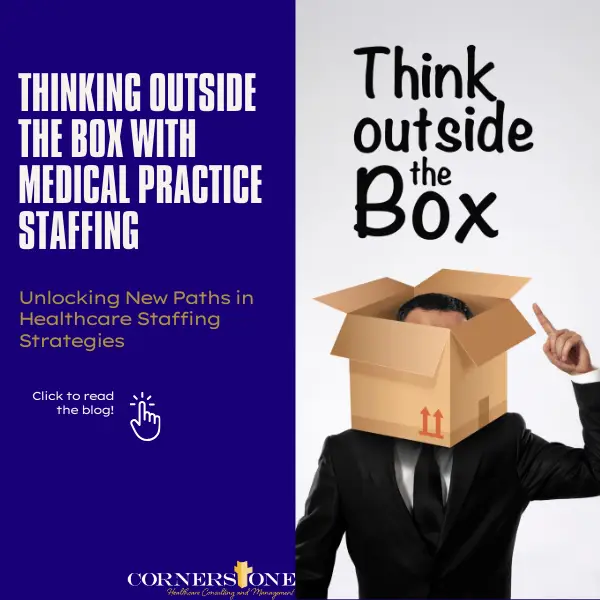Thinking Outside the Box with Medical Practice Staffing
The COVID-19 pandemic has reshaped medical practice staffing and the healthcare landscape in countless ways. One of the most significant challenges facing medical practices today is the ability to secure and retain qualified staff. For those running
private practices, this hurdle can feel particularly insurmountable, with the struggle to balance competitive wages, high turnover rates, and limited applicant pools.
Sound familiar? You’re not alone.
This post explores some innovative staffing approaches that have helped medical practices address these challenges and improve efficiency—all while staying mindful of
overhead costs. While there may be no one-size-fits-all solution, adopting a flexible and creative mindset might help unlock new staffing opportunities for your practice.
The Medical Practice Staffing Challenges Since COVID-19
Since the pandemic began, the healthcare sector has faced unprecedented staffing issues:
-
- Applicant Shortages: After posting job openings, many practice managers encounter a disappointingly small pool of applicants. For those who do apply and make it to the interview stage, only about half might actually show up.
-
- Turnover Concerns: Even after successfully hiring a new staff member, there’s no guarantee they’ll stick around. Practice managers are often left wondering, “Will this staff member actually show up for their first shift?”
-
- Competing Wages: Private practices face tough competition when it comes to wages. Hospitals and larger healthcare systems can often offer significantly higher pay, making it difficult for smaller practices to retain talented staff.
These challenges require practice managers and healthcare professionals to think beyond traditional staffing models and explore creative solutions.
Thinking Creatively About Staffing
Given these ongoing difficulties, our approach has been to rethink medical practice staffing and how it is done. By working outside the typical playbook, we’ve uncovered new possibilities for attracting and retaining high-quality hires, with a significant focus on remote opportunities.
The Remote Staffing Advantage
When we opened a job posting for a
remote medical biller, the response was astounding—we received hundreds of applications. Inspired by this success, we decided to expand this idea and propose hiring a
remote medical receptionist. The result? An equally high response rate.
Remote opportunities appeal to a broader range of candidates for several reasons:
-
- They remove geographical limitations, allowing you to tap into talent pools outside your local area.
-
- Remote work is highly desirable in today’s job market, with many candidates seeking flexibility and work-life balance.
-
- Practices can lower overhead costs by avoiding the need for additional space or in-office resources.
These high response rates underscore the appeal of flexible, remote positions within the healthcare field.
Expanding Remote Roles Beyond Receptionists
Recognizing the potential of remote work, we’ve expanded this staffing model to include other essential roles. For instance, we now contract staff members who:
-
- Handle prior authorizations with efficiency and consistency.
-
- Assist with new patient appointment scheduling while ensuring a smooth process for both patients and the practice.
This approach has led to clear benefits for our clients, including enhanced operational efficiency and reduced burden on in-office staff.
Benefits of Thinking Outside the Box in Staffing
The innovative staffing strategies we’ve implemented have provided noticeable advantages for medical practices:
-
-
- Improved Efficiency: Remote staff are often highly specialized in their roles, which helps streamline workflows and reduce bottlenecks. For example, outsourced prior authorizations allow in-office staff to focus on patient care.
-
- Higher Applicant Pools: Remote roles attract significantly more applicants than traditional in-office positions, giving practices a wider selection of qualified candidates.
-
- Reduced Overhead: Remote staffing reduces costs associated with workstation setups, office space, and commuting stipends.
-
- Work-Life Flexibility for Staff: Offering remote roles enhances employee satisfaction, helping with both retention and productivity.
Final Thoughts
The staffing challenges brought about by COVID-19 have pushed medical practices to reevaluate their hiring processes. For
private practices especially, a shift toward remote work and creative staffing solutions can make a world of difference. When implemented thoughtfully, these strategies can not only attract more candidates but also improve overall practice efficiency and help practices run smoother
operations.
If you’re still struggling to find and retain qualified staff for your practice, it may be time to think outside the box. Explore opportunities for remote roles, delegate specialized tasks, and seek support from staffing professionals who understand the unique needs of the healthcare industry.
By staying flexible and open to change, your practice can meet today’s staffing challenges head-on and provide excellent patient care for years to come.


